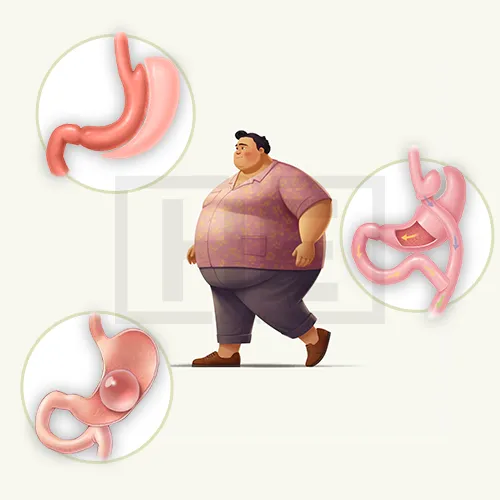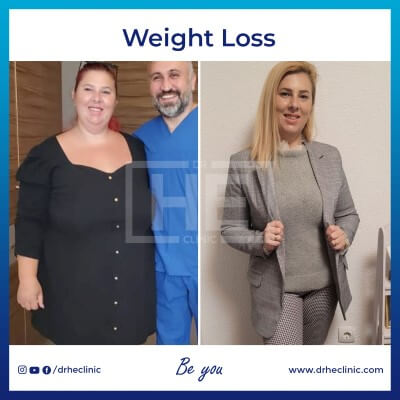Obesity Treatment in Turkey – Safe & Affordable in 2026
Obesity treatment in Turkey offers a range of effective options, including bariatric surgeries (gastric bypass, gastric sleeve) and non-surgical methods (diet programs, lifestyle changes). Known for affordable, high-quality medical care, Turkey provides comprehensive treatment packages with experienced professionals and advanced facilities.

Comprehensive Guide to Obesity Treatment in Turkey
Obesity treatment in Turkey involves a comprehensive approach, starting with a detailed consultation and medical evaluation. Patients undergo a series of tests to determine their suitability for surgery and to tailor the treatment plan to their specific needs. The most common procedures include gastric sleeve, gastric bypass, and gastric balloon, each performed using advanced laparoscopic techniques. The surgeries are conducted in state-of-the-art facilities by experienced bariatric surgeons. Post-operative care includes regular follow-ups, nutritional guidance, and support for lifestyle changes to ensure long-term success.
Obesity Treatment Steps

Assessment: Evaluation of health and obesity severity to decide on treatment options.
Lifestyle Changes:
- Diet: Reduce calorie intake with a healthier diet.
- Exercise: Increase physical activity.
Behavioral Therapy: Counseling to modify eating behaviors.
Medical Interventions:
- Medications: Use drugs to help with weight loss.
- Non-Surgical: Procedures like the gastric balloon.
Surgery: Options include gastric sleeve, gastric bypass, and others for significant weight reduction.
Follow-Up: Regular health monitoring and support groups for maintenance.
Types of Obesity Treatment

Gastric Sleeve: This surgery involves removing part of the stomach to reduce its size, which limits food intake and promotes a feeling of fullness sooner.
Gastric Bypass: In this procedure, a small pouch is created at the top of the stomach and connected directly to the small intestine, bypassing most of the stomach and some of the intestine. This reduces the amount of food that can be consumed and the calories absorbed.
Gastric Balloon (Intragastric Balloon): This is a non-surgical, temporary weight loss procedure that involves placing a saline-filled silicone balloon into the stomach. This balloon helps by occupying space in the stomach, which makes the patient feel fuller faster and reduces the amount of food they can eat at one time.

Need Help? Contact Us!
7/24 Obesity Help Desk
Obesity Treatment
All Inclusive Packages-
Pre-Op Examinations
-
Sleeve Gastrectomy Weight-Loss Surgery
-
Medication and Diet Plan
-
6-7 Night Accommodation
-
Post-Op Support & Counselling
-
VIP Transportation
Obesity Treatment Turkey Cost 2026
As of 2026, the cost of obesity Treatment in Turkey varies depending on the type of surgery, the hospital, and other factors.
The average cost of obesity Treatment in Turkey is approximately between $2,000 and $7,000. This range is considerably lower compared to countries like the United States or the United Kingdom.
🌍 Obesity Treatment Prices by Country
Obesity treatment prices vary significantly by country, with Turkey often offering some of the most competitive rates. The lower costs in Turkey are primarily due to the country’s favorable exchange rate, lower operating expenses, and government incentives to promote medical tourism. These factors allow Turkish clinics to provide high-quality care at a fraction of the price found in Western countries, making it an attractive option for international patients.
| Region | Average Obesity Treatment Cost |
 Turkey Turkey | $2,000 – $7,000 or more |
 USA USA | $7,000 – $12,000 or more |
 Canada Canada | $7,000 – $12,000 or more |
 UK UK | £6,000 – £8,000 or more |
 Australia Australia | AUD 7,000 – AUD 15,000 or more |
 Germany Germany | €6,000 – €10,000 or more |
 France France | €6,000 – €10,000 or more |
Why does Obesity Treatment Cost in Turkey Cheap?
- Exchange rate: Favorable exchange rates for foreign currencies relative to the Turkish lira can make procedures even cheaper for international patients.
- Standardized procedures: Many Turkish clinics employ standardized protocols and techniques for common procedures like obesity Treatment , achieving efficiency and cost savings.
How to Reach Turkey?
By Air: Turkey is well-connected with direct flights from major cities around the world. There are international airports in Istanbul, Ankara, Antalya, and Izmir, among others. You can check for flights from your nearest major airport to one of these Turkish cities.
By Sea: Turkey has several ports that receive passenger ferries from neighboring countries and islands. You can travel to Turkey by ferry from Greece, Russia, Ukraine, and other nearby locations. Major ports include Istanbul, Izmir, and Antalya.
By Train: While not as common as air or sea travel, you can also reach Turkey by train from select European cities. The most common routes are from Sofia, Bulgaria, and Bucharest, Romania, to Istanbul. However, train travel to Turkey may require multiple transfers and take longer compared to air or sea travel.
| Departure City | Arrival City | Duration | Estimated Price |
|---|---|---|---|
| 🛫 London (LHR) | 🛬 Istanbul (IST) | ⏰ 3 hours 50 minutes | 💰 $300 |
| 🛫 Manchester (MAN) | 🛬 Istanbul (IST) | ⏰ 4 hours 35 minutes | 💰 $350 |
| 🛫 Paris (CDG) | 🛬 Istanbul (IST) | ⏰ 3 hours 25 minutes | 💰 $280 |
| 🛫 Frankfurt (FRA) | 🛬 Istanbul (IST) | ⏰ 2 hours 55 minutes | 💰 $320 |
| 🛫 Moscow (VKO) | 🛬 Istanbul (IST) | ⏰ 4 hours 25 minutes | 💰 $400 |
📸 Places to Visit in Turkey
Istanbul is a city where East meets West, blending centuries of history with a vibrant modern lifestyle. Start your journey at Hagia Sophia, a stunning architectural marvel that once served as a church and mosque. Right across, the Blue Mosque stands with its six minarets and elegant interior. Topkapi Palace offers a deep dive into the life of Ottoman sultans.
Don’t miss the Grand Bazaar, one of the world’s oldest and largest covered markets, and the nearby Spice Bazaar for colorful Turkish delights. For a unique view of the city, take a Bosphorus cruise and sail between two continents. Finish your day with a walk along Istiklal Street and a visit to Galata Tower for panoramic views.
As the capital of Türkiye, Ankara offers a different vibe from Istanbul—more laid-back, with a strong sense of national identity. The city’s highlight is Anıtkabir, the mausoleum of Mustafa Kemal Atatürk, founder of modern Türkiye. It’s a place of deep national pride and impressive architecture.
Visit the Museum of Anatolian Civilizations, which houses artifacts dating back to prehistoric times, showcasing the region’s rich cultural layers. Walk through Ankara Castle, offering sweeping views of the city and a peek into its ancient roots. The historic neighborhood of Hamamönü is perfect for a coffee break, with restored Ottoman houses, art shops, and local eateries.
Izmir, located on the Aegean coast, is known for its relaxed atmosphere, rich history, and youthful energy. Begin with a walk along the Kordon, a beautiful seaside promenade lined with palm trees and cozy cafés. Don’t miss the Clock Tower in Konak Square, the symbol of the city.
Explore the Agora of Smyrna, a Roman-era marketplace with columns and arches that whisper ancient stories. Dive into local culture at the Kemeraltı Bazaar, full of handcrafted goods and delicious street food. In the evenings, head to Alsancak for vibrant nightlife and sea-view restaurants.
Antalya is the jewel of the Turkish Riviera, known for its turquoise waters, golden beaches, and historical treasures. The old town, Kaleiçi, is full of charm with cobblestone streets, Ottoman-era houses, and boutique hotels. Discover Hadrian’s Gate, a Roman triumphal arch, and the ancient harbor now turned into a lively marina.
Enjoy a relaxing day at Konyaaltı or Lara Beach, perfect for swimming and sunbathing. Take a trip to the breathtaking Düden Waterfalls or hike in Köprülü Canyon. History lovers should visit the ancient cities of Perge, Aspendos, and Side, all within easy reach.





Obesity Treatment Before and After Photos
Submit your request for access to before and after photos to see actual patient results from our many cosmetic procedures and treatments at Dr. HE Clinic.
Obesity Treatment Turkey Reviews

Posted on
Truspilot
Posted on
TruspilotIs it Safe To Have A Obesity Treatment in Turkey?
Having obesity Treatment in Turkey can be safe, provided that certain conditions are met. Turkey has a growing reputation in medical tourism, including bariatric (obesity) Treatment, due to its combination of lower costs and high-quality medical care.
While many patients have successful surgery in Turkey with positive outcomes, it’s crucial to do thorough research and make informed decisions.
Frequently Asked Questions About Obesity Treatment
Does Health Insurance Pay for the Obesity Treatment?
Whether health insurance covers obesity Treatment depends on several factors including the specific insurance policy, the type of surgery, the patient’s medical history, and the guidelines set by the insurance provider.
How Long Does Obesity Treatment Take?
Gastric Bypass (Roux-en-Y): This procedure typically takes between 2 to 3 hours. It involves creating a small stomach pouch and rerouting the small intestine to this pouch.
Sleeve Gastrectomy: This surgery usually takes about 1 to 2 hours. It involves removing a portion of the stomach to create a smaller, sleeve-shaped stomach.
Adjustable Gastric Banding: This is often the shortest of the three, taking about 1 hour. The procedure involves placing a band around the upper part of the stomach to create a small stomach pouch.
Is Obesity Treatment Painful?
Obesity Treatment, like any major surgical procedure, can be associated with some degree of pain and discomfort, particularly during the initial recovery period. However, the experience of pain can vary greatly from person to person.
Is There a Scar After The Obesity Treatment?
Typically leaves 3-5 small laparoscopic scars (0.5-1.5 cm) on the abdomen, one near the belly button and others around the upper abdomen.
Scars gradually fade to become paler and flatter, potentially blending with surrounding skin in 1-2 years.
QUALITY CERTIFICATES





















Posted on
Truspilot